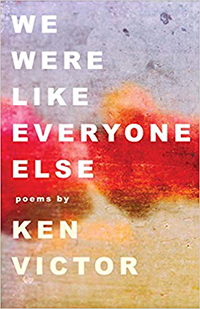Reviews
Poetry Review by Joseph LaBine
Ken Victor, We Were Like Everyone Else (Toronto: Cormorant, 2019). Paperbound, 72 pp., $18.95.
 Ken Victor’s first poetry collection, We Were Like Everyone Else, explores daily family life with a keen world-awareness. In these well-developed poems, many of which have already appeared in Canadian and US journals, the author assembles a body of work of many years’ crafting. The poems are not new; they were not written hurriedly, but compiled over “a lifetime spent scratching,” to borrow Victor’s phrase.
Ken Victor’s first poetry collection, We Were Like Everyone Else, explores daily family life with a keen world-awareness. In these well-developed poems, many of which have already appeared in Canadian and US journals, the author assembles a body of work of many years’ crafting. The poems are not new; they were not written hurriedly, but compiled over “a lifetime spent scratching,” to borrow Victor’s phrase.
Violence lurks behind the poems in We Were Like Everyone Else. A man out paddling in his canoe discovers a wounded loon twisted in line with a fishhook lodged in its neck. A decadent meal in “Lunch at Les Fougères” leads the speaker to contemplate his own death: “why not say / we are each / alive & admit … we don’t / care / what comes after.” Victor’s slow and subtle line breaks ratchet up tension throughout the collection. His speaker’s frequent worries (about himself or his friends and family) contrast with sharp imagery like that of the fall of the wall in Berlin, or of school children in the 1950s cowering under desks as they prepare for the possibility of a nuclear strike. Victor blends the personal and public well. The speaker of another poem describes a photograph of a beauty pageant staged during the 1993 siege of Sarejevo. This war imagery and Victor’s efforts to discuss beauty amid violence prompt difficult questions: is irony too often brutal? Who wants to be disturbed by what’s going on in the world when raising children, or dining in Chelsea, or walking in the woods, or working in an office?
One can glean awareness of the universal from reading these poems. They shift between small, private moments and larger impressions. Fatherhood is a recurring motif, explored through the speaker’s recollections in “Portrait of the Family without a Father” and “My Father Talks to Me for the First Time,” alongside reflections about what it means to be a father in “After My Six-Year-Old Son’s Inquiry” and “Between His Wife and Newborn Daughter.” Victor avoids being too sentimental by overlaying personal reflection with historical insight. “A Short History of Disasters” conflates several catastrophes brilliantly: “the ocean’s white tooth rising from / its dark gums to crack the Titanic, then Cindy, / ditching me when I was seventeen and not ready for ditching, Chernobyl and Bhopal ….”
One of the most ambitious poems in the collection is the four-page sequence, “The Idea of North,” which is named after a radio documentary produced by Glenn Gould in 1967, the first piece in Gould’s Solitude Trilogy. This poem initially upset me, reading it as I moved apartments from Iqaluit to Yellowknife, because it seemed to reify this problem-notion of an empty north. The speaker states, “What matters / is believing we live on the edge / of something enormously empty …. When the flag of another country / gets planted there / tell them / it was our idea.” I stopped reading the poem—almost stopped reading Victor’s book. However, re-reading “The Idea of North” was deeply satisfying. This challenging poem reveals that any collective idea of “the North” can be a problem. In his documentary, Gould uses the experimental technique of layering voices on top of each other to create a sonic experience in the liminal space between music and train conversation. He called it “contrapuntal radio.” Victor achieves a similar effect by numbering his sections and layering impressions of the north one on top of the other to make a sequence. In section eight, the speaker sees someone “Asleep / at Bloor and Eglinton / no one wakes / to see the Aurora Borealis in your brain.” The scene is nearly impossible because Bloor and Eglinton do not intersect. But Victor unites these Toronto streets for a reason; they are a sequence of stops on the TTC if you are on the Yonge line heading north. Toronto with its various “selves … lawyer token collector rave bouncer” forms the setting and constituency for this poem. As with Gould’s documentary, southerners are the target audience. Victor presents emptiness, or a void, which his speaker absent-mindedly fills with northern clichés, northern lights, “a snowy owl … on an inukshuk.” The speaker does not address Nunavummiut, nor does he speak to anything real or concrete about the north, although the epigraph originates in Adrienne Clarkson’s speech at the Third Northern Research Forum in Yellowknife. The poem enacts a beautiful deconstruction: in one sense, that the north is empty, but in another, far more important sense, that idea of the north is empty.
Victor’s poetry does not shy away from ugly realities and difficult content. The suite of Jewish poems, “The Last Itinerant Rabbi,” “Passover 1998,” “Canadian Jew Haiku,” and “Just Like Us,” is marvellous. Like Victor’s formalism, a constant breaking down of lines and barriers to meaning, many of these poems reveal a constant breaking down of the self: “They were them / because they weren’t us; / we were us because / whatever we were / we weren’t them.” There is much to admire in We Were Like Everyone Else—the book reads like a Greatest Hits album.
—Joseph LaBine









